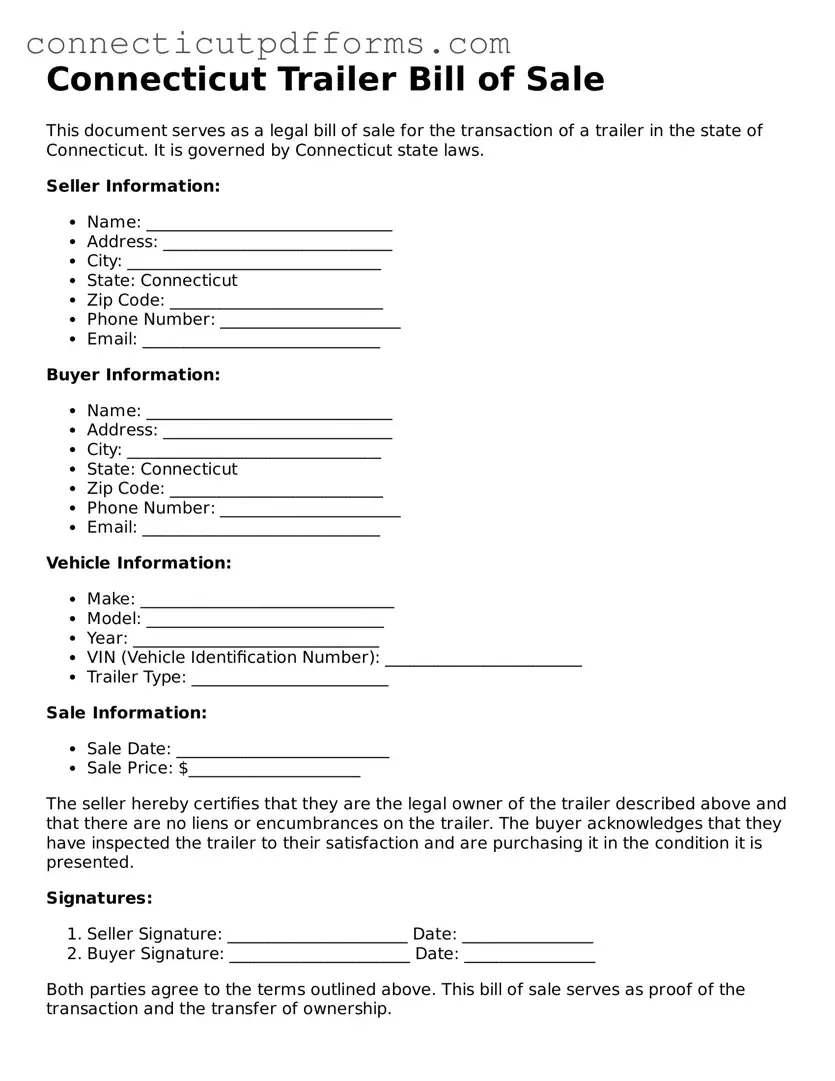The Connecticut Trailer Bill of Sale form shares similarities with the Vehicle Bill of Sale. Both documents serve as proof of transfer of ownership from one party to another. They typically include essential details such as the buyer's and seller's names, addresses, and the vehicle's identification number (VIN). This ensures that both parties have a clear record of the transaction, which can be helpful for future reference, especially when registering the vehicle or trailer with the state.
Another document that resembles the Trailer Bill of Sale is the Boat Bill of Sale. Just like the trailer version, the Boat Bill of Sale facilitates the transfer of ownership for a watercraft. It includes similar information, such as the make, model, and hull identification number (HIN). This document is crucial for registering the boat with the appropriate authorities and ensuring that the new owner has the legal right to operate the vessel.
The Motorcycle Bill of Sale is another related document. This form captures the essential details involved in transferring ownership of a motorcycle. It includes the same basic elements found in the Trailer Bill of Sale, such as the buyer's and seller's information, motorcycle specifications, and any relevant identification numbers. Having this document can help prevent disputes and provides a clear record of the sale for both parties.
In addition, the RV Bill of Sale is quite similar. It serves the same purpose of documenting the sale of a recreational vehicle. This document outlines the details of the transaction, including the RV's make, model, and VIN. Just as with the Trailer Bill of Sale, having a well-documented RV Bill of Sale can simplify the registration process and protect both the buyer and seller from potential legal issues.
The Mobile Home Bill of Sale also shares key characteristics with the Trailer Bill of Sale. This document is used when transferring ownership of a mobile home, which can be considered a type of trailer. It includes details such as the buyer's and seller's information, the mobile home's identification number, and any applicable warranties. This ensures that the new owner has all the necessary documentation to register the mobile home with local authorities.
For individuals looking to address potential disputes, completing a "legal cease and desist letter" can be a prudent step. This letter serves to formally demand that unwanted actions cease, establishing a clear record of the request. To initiate this process, you can find the necessary form at the Washington Cease and Desist Letter form.
Another document that is quite similar is the ATV Bill of Sale. This form is used when transferring ownership of an all-terrain vehicle. Like the Trailer Bill of Sale, it captures vital information about the buyer, seller, and the ATV itself, including its make, model, and VIN. This document is important for ensuring that the transaction is legally recognized and can assist in the registration process with state authorities.
Lastly, the General Bill of Sale can also be compared to the Trailer Bill of Sale. While it may not be specific to vehicles or trailers, it serves a similar purpose of documenting the sale of personal property. This document includes the names of both parties, a description of the item sold, and the sale price. Although it is more generic, it still provides a legal framework for the transfer of ownership, much like the Trailer Bill of Sale does for trailers.

